David Tallerman's Blog, page 30
March 11, 2016
Film Ramble: Drowning in Nineties Anime, Pt. 9
More nineties anime? It must be a slow news week! This time around we'll be looking at Patlabor 2, Madox-01, Zaion: I Wish You Were Here and Psycho Diver:
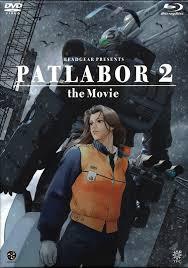 Patlabor 2, 1993, Mamoru Oshii
Patlabor 2, 1993, Mamoru Oshii
If the first Patlabor movie was the work of a director discovering what was to become his signature style, the second is that of an extraordinary talent who's worked out in the intervening four years just precisely what sorts of movies he wants to make and how he wants them to be made. Both are unmistakably works from the same artist, but Patlabor 2 is just ... I guess the word is purer. Which is not the same as saying better - I would argue that if we take the Patlabors and 1995's Ghost in the Shell to be Oshii's masterpieces then Patlabor 2 is marginally the weakest of the three. Then again, that still leaves it as an extraordinary work that you should track down right this moment if you haven't seen it, so I'm hardly criticizing.
Where the first Patlabor was largely a police procedural that just happened to sometimes bother itself with giant robots, this second is absolutely a political thriller, and concerns itself with giant robots even less, such that for long stretches it barely feels like a Patlabor movie at all. That fact is only heightened by the fact that Oshii largely sidelines most of the regular cast of Special Vehicle Unit 2 to cameos and focuses instead on their two superior officers - who were admittedly always the best characters, but that doesn't stop it feeling a little cheeky. In general, this has the vibe of a franchise movie where the director had already moved on from the franchise, which is somewhat hard to deal with as a Patlabor fan but basically a delight as an Oshii fan, since what he'd moved onto being, for ever so brief a period, was one of the greatest creative presences the medium has ever seen.
The thing is, Patlabor 2 is slow, meditative, relatively low on action, but what it loses by such traditional measures of anime it more than makes up for by being thrillingly original and unique: a work of obvious artistry which at the same time works as a precisely constructed sci-fi thriller, ticking away like gorgeously-constructed clockwork. I prefer the first Patlabor because it's the more rounded of the two, I prefer Ghost in the Shell because it was my first encounter with Oshii and with smart anime in general. But neither fact detracts from what excellent workmanship this represents. Patlabor 2 was revolutionary when it was released, a challenge to the strictures of its medium and its genre that also functions as a bold, unconventional sci-fi thriller, and also manages to be a masterpiece of the animator's craft. If Manga would have the decency to rerelease it in a less crummy edition, it would stand effortlessly against anything released in the last decade.
 Madox-01, 1987, Shinji Aramaki
Madox-01, 1987, Shinji Aramaki
Another release from Manga Video's old and much maligned (by me, if no one else) budget range The Collection, my expectations for Madox-01 were muted, to say the least. As such, I suppose it's high praise to say that I quite enjoyed it.
Its basic concept is utterly silly: a prototype robotic suit, the Madox-01 of the title, falls into the hands of a teenager, who promptly decides to use it to meet his girlfriend, despite the suit's designer and test pilot and a deranged military officer's best efforts to get in his way and recover or destroy the Madox. You'd expect this to be played for broad comedy, so it's rather puzzling when instead it's presented mostly straight, with only a few stray gags acknowledging how basically wacky the whole endeavor is. On the one hand, this keeps things moving briskly, the slim story never bogging down to think too much about its premise; on the other, it feels like a wasted opportunity, as the one thing that makes Madox-01 distinctive gets largely left by the wayside.
Still, it's enough to give the show a little character, and the animation is generally impressive, especially for the late eighties. The mech design is sufficiently distinctive and the final battle is really pretty good. At forty five or so minutes it feels precisely as long as it needs to without wearing out its welcome. Even the dub isn't catastrophic in comparison with some of Manga's efforts from the time, though as usual there's hardly anyone who doesn't either overact or underact. And this is some seriously faint praise, isn't? I'm trying to be positive, I really am, but it's just not working.
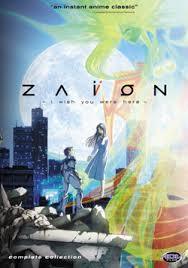 Zaion: I Wish You Were Here, 2001, dir: Seiji Mizushima
Zaion: I Wish You Were Here, 2001, dir: Seiji Mizushima
Never one to worry about breaking my own rules, here's a four episode series from 2001, which I'm going to talk about anyway because I thought it was nineties anime when I bought it and because, hey, why not?
Plus, Zaion is a frustrating show, and I want to vent. There are so many indications that this could, and should, have been something special - it was produced by Gonzo, who were practically churning out good anime at this point - and the fact that the end result is rather bland and kind of a mess is deeply unsatisfactory.
It doesn't help that Zaion found generally reliable distributor ADV in particularly mercenary mood; those four episodes are split, unconscionably, over two DVD releases. However, to justify the decision ADV included some unusually lavish extras - the enclosed booklets are particularly lovely - that give away far more details about how things went wrong behind the scenes than they were probably meant to. The impression they give is of a lot of at least moderately talented people pulling in no clear direction, led by a director working at odds to his own writer. So the fact that the result was a schizophrenic mix of undercooked love story and half-baked sci-fi action, the former undone by lifeless characters and the latter by dubious animation, truly horrid CGI and bland designs, comes as little surprise.
Yet Zaion isn't awful. It just spends too much time being merely functional, and, like I said, frustrating. And at least one person was clear on what they wanted for the project, even if it was a fundamentally insane decision: ever-brilliant composer
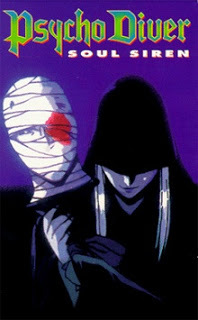 Psycho Diver, 1995, dir: Mamoru Kanbe
Psycho Diver, 1995, dir: Mamoru Kanbe
Here's a question for you: you're making a film called Psycho Diver, about a world where skilled individuals use technology to enter the subconscious minds of others, acting as a particularly hands-on brand of therapist. Do you a) play the concept for all its worth, indulging in the sort of trippy dreamscapes only animation could possibly allow or b) do your absolute best to ignore the concept in favour of an overstuffed plot full of entirely mundane fistfights and car chases?
If you voted b) then a slow hand-clap for you, because you were probably one of the production team behind Psycho Diver, a fifty minute OVA that does everything it can to avoid embracing the one element that might possibly make it something special. What we get instead is a forcedly noir, needlessly violent show about a voice over-happy tough guy hired to sort out the incipient craziness of a pop star who can no longer sing. (There are two of her songs on the soundtrack and they're both indescribably awful, which begs the question of why anyone would care.)
Psycho Diver is humourless and weirdly dense with plot and characters, but the one thing it isn't is interested in exploring its core concept, which could be all but jettisoned with barely the slightest effect on the plot. In fact things would actually make more sense if the protagonist was simply a psychiatrist, and goodness knows we need more shows about gritty, hardboiled psychiatrists! As failings go, it's flat out annoying, because the brief scenes that do play on the whole psycho diving notion are the most visually interesting, and director Mamoru Kanbe - who would go on to make the notorious Elfen Lied - was certainly capable of doing more with the notion than this. Psycho Diver isn't actually bad as such; for what it is, it's fairly diverting for its short running time. But by promising something genuinely interesting that it hasn't the faintest interest in delivering, the movie falls flatter than it needs to.
Ultimately, then, the best thing about Psycho Diver is that you don't have any reason to watch it; not when Satoshi Kon's magnificent Paprika exists, and does all the things this should have done, a hundred times better than Psycho Diver ever would have.
-oOo-
Wow, that was another awful month, wasn't it? I sure can pick 'em! The strange thing is, practically everything on my to-watch shelf looks great, so I'm not sure what's going wrong here. Then again, Zaion looked great, so perhaps it's time I accepted that looks can be deceiving when it comes to nineties (or even early two thousands) anime. Still, I have faith! There must be another classic or two out there I haven't found yet. There must be!
I mean ... there must be, right?
[Other posts in this increasingly desperate series: Part 1, Part 2, Part 3, Part 4, Part 5, Part 6, Part 7, Part 8]
 Patlabor 2, 1993, Mamoru Oshii
Patlabor 2, 1993, Mamoru OshiiIf the first Patlabor movie was the work of a director discovering what was to become his signature style, the second is that of an extraordinary talent who's worked out in the intervening four years just precisely what sorts of movies he wants to make and how he wants them to be made. Both are unmistakably works from the same artist, but Patlabor 2 is just ... I guess the word is purer. Which is not the same as saying better - I would argue that if we take the Patlabors and 1995's Ghost in the Shell to be Oshii's masterpieces then Patlabor 2 is marginally the weakest of the three. Then again, that still leaves it as an extraordinary work that you should track down right this moment if you haven't seen it, so I'm hardly criticizing.
Where the first Patlabor was largely a police procedural that just happened to sometimes bother itself with giant robots, this second is absolutely a political thriller, and concerns itself with giant robots even less, such that for long stretches it barely feels like a Patlabor movie at all. That fact is only heightened by the fact that Oshii largely sidelines most of the regular cast of Special Vehicle Unit 2 to cameos and focuses instead on their two superior officers - who were admittedly always the best characters, but that doesn't stop it feeling a little cheeky. In general, this has the vibe of a franchise movie where the director had already moved on from the franchise, which is somewhat hard to deal with as a Patlabor fan but basically a delight as an Oshii fan, since what he'd moved onto being, for ever so brief a period, was one of the greatest creative presences the medium has ever seen.
The thing is, Patlabor 2 is slow, meditative, relatively low on action, but what it loses by such traditional measures of anime it more than makes up for by being thrillingly original and unique: a work of obvious artistry which at the same time works as a precisely constructed sci-fi thriller, ticking away like gorgeously-constructed clockwork. I prefer the first Patlabor because it's the more rounded of the two, I prefer Ghost in the Shell because it was my first encounter with Oshii and with smart anime in general. But neither fact detracts from what excellent workmanship this represents. Patlabor 2 was revolutionary when it was released, a challenge to the strictures of its medium and its genre that also functions as a bold, unconventional sci-fi thriller, and also manages to be a masterpiece of the animator's craft. If Manga would have the decency to rerelease it in a less crummy edition, it would stand effortlessly against anything released in the last decade.
 Madox-01, 1987, Shinji Aramaki
Madox-01, 1987, Shinji AramakiAnother release from Manga Video's old and much maligned (by me, if no one else) budget range The Collection, my expectations for Madox-01 were muted, to say the least. As such, I suppose it's high praise to say that I quite enjoyed it.
Its basic concept is utterly silly: a prototype robotic suit, the Madox-01 of the title, falls into the hands of a teenager, who promptly decides to use it to meet his girlfriend, despite the suit's designer and test pilot and a deranged military officer's best efforts to get in his way and recover or destroy the Madox. You'd expect this to be played for broad comedy, so it's rather puzzling when instead it's presented mostly straight, with only a few stray gags acknowledging how basically wacky the whole endeavor is. On the one hand, this keeps things moving briskly, the slim story never bogging down to think too much about its premise; on the other, it feels like a wasted opportunity, as the one thing that makes Madox-01 distinctive gets largely left by the wayside.
Still, it's enough to give the show a little character, and the animation is generally impressive, especially for the late eighties. The mech design is sufficiently distinctive and the final battle is really pretty good. At forty five or so minutes it feels precisely as long as it needs to without wearing out its welcome. Even the dub isn't catastrophic in comparison with some of Manga's efforts from the time, though as usual there's hardly anyone who doesn't either overact or underact. And this is some seriously faint praise, isn't? I'm trying to be positive, I really am, but it's just not working.
 Zaion: I Wish You Were Here, 2001, dir: Seiji Mizushima
Zaion: I Wish You Were Here, 2001, dir: Seiji Mizushima Never one to worry about breaking my own rules, here's a four episode series from 2001, which I'm going to talk about anyway because I thought it was nineties anime when I bought it and because, hey, why not?
Plus, Zaion is a frustrating show, and I want to vent. There are so many indications that this could, and should, have been something special - it was produced by Gonzo, who were practically churning out good anime at this point - and the fact that the end result is rather bland and kind of a mess is deeply unsatisfactory.
It doesn't help that Zaion found generally reliable distributor ADV in particularly mercenary mood; those four episodes are split, unconscionably, over two DVD releases. However, to justify the decision ADV included some unusually lavish extras - the enclosed booklets are particularly lovely - that give away far more details about how things went wrong behind the scenes than they were probably meant to. The impression they give is of a lot of at least moderately talented people pulling in no clear direction, led by a director working at odds to his own writer. So the fact that the result was a schizophrenic mix of undercooked love story and half-baked sci-fi action, the former undone by lifeless characters and the latter by dubious animation, truly horrid CGI and bland designs, comes as little surprise.
Yet Zaion isn't awful. It just spends too much time being merely functional, and, like I said, frustrating. And at least one person was clear on what they wanted for the project, even if it was a fundamentally insane decision: ever-brilliant composer
 Psycho Diver, 1995, dir: Mamoru Kanbe
Psycho Diver, 1995, dir: Mamoru KanbeHere's a question for you: you're making a film called Psycho Diver, about a world where skilled individuals use technology to enter the subconscious minds of others, acting as a particularly hands-on brand of therapist. Do you a) play the concept for all its worth, indulging in the sort of trippy dreamscapes only animation could possibly allow or b) do your absolute best to ignore the concept in favour of an overstuffed plot full of entirely mundane fistfights and car chases?
If you voted b) then a slow hand-clap for you, because you were probably one of the production team behind Psycho Diver, a fifty minute OVA that does everything it can to avoid embracing the one element that might possibly make it something special. What we get instead is a forcedly noir, needlessly violent show about a voice over-happy tough guy hired to sort out the incipient craziness of a pop star who can no longer sing. (There are two of her songs on the soundtrack and they're both indescribably awful, which begs the question of why anyone would care.)
Psycho Diver is humourless and weirdly dense with plot and characters, but the one thing it isn't is interested in exploring its core concept, which could be all but jettisoned with barely the slightest effect on the plot. In fact things would actually make more sense if the protagonist was simply a psychiatrist, and goodness knows we need more shows about gritty, hardboiled psychiatrists! As failings go, it's flat out annoying, because the brief scenes that do play on the whole psycho diving notion are the most visually interesting, and director Mamoru Kanbe - who would go on to make the notorious Elfen Lied - was certainly capable of doing more with the notion than this. Psycho Diver isn't actually bad as such; for what it is, it's fairly diverting for its short running time. But by promising something genuinely interesting that it hasn't the faintest interest in delivering, the movie falls flatter than it needs to.
Ultimately, then, the best thing about Psycho Diver is that you don't have any reason to watch it; not when Satoshi Kon's magnificent Paprika exists, and does all the things this should have done, a hundred times better than Psycho Diver ever would have.
-oOo-
Wow, that was another awful month, wasn't it? I sure can pick 'em! The strange thing is, practically everything on my to-watch shelf looks great, so I'm not sure what's going wrong here. Then again, Zaion looked great, so perhaps it's time I accepted that looks can be deceiving when it comes to nineties (or even early two thousands) anime. Still, I have faith! There must be another classic or two out there I haven't found yet. There must be!
I mean ... there must be, right?
[Other posts in this increasingly desperate series: Part 1, Part 2, Part 3, Part 4, Part 5, Part 6, Part 7, Part 8]
Published on March 11, 2016 12:56
March 7, 2016
Short Story News, March 2016
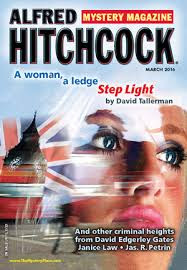 It's been a while since I recapped any news on the short story front, perhaps because I've been distracted by having an entire collection of the things out. But while the release of The Sign in the Moonlight and Other Stories at the end of the last month - available from Amazon UK and Amazon US, amongst other places! - has certainly been the biggest thing happening, it's been by no means the only one.
It's been a while since I recapped any news on the short story front, perhaps because I've been distracted by having an entire collection of the things out. But while the release of The Sign in the Moonlight and Other Stories at the end of the last month - available from Amazon UK and Amazon US, amongst other places! - has certainly been the biggest thing happening, it's been by no means the only one.There is, for example, the publication - as cover story, no less! - of my first and so far only stab at crime short fiction, Step Light, in the prestigious Alfred Hitchcock Mystery Magazine. I remain completely gobsmacked that this ever happened, it seemed like a huge risk dipping my toes into a genre I had no experience of and it's hard to imagine how it could possibly have worked out any better.
(Though, if you should ever want to suck all the fun out of having a story published in a well-respected magazine for someone, do what some complete stranger did to me and message them to point out that it was full of mistakes. For maximum fun-sucking, make sure to be as blunt as possible, and to not tell them what those mistakes actually were.)
Meanwhile, at the end of last year, A Killer of Dead Men marked my second appearance in the ever-wonderful Beneath Ceaseless Skies, and my second tale following the adventures of master-assassin Otranto Onsario: you can read it here or listen to it here, but I'd strongly recommend opting for the latter because it's a great rendition. Still on the dark fantasy front, one of my personal favourites stories, The Magpie of Souls, got picked up by new market Cosmic Roots and Eldritch Shores. This is the tale of two archetypes, the evil sorcerer and the heroic warrior, coming face to face with each other and their own natures and discovering that perhaps they've turned out to be very different people to what they once intended. It should be out by the time you read this, and though you'll need to subscribe, doing so will only set you back a modest $12 for this first year. Meanwhile, another recently appeared market, Liminal Stories, picked up my incredibly odd science fiction story Team Invasion - seriously, this is the oddest thing I've written in years - and Golgotha, an historical horror story of sorts, is set to appear in the upcoming Mysterion anthology.
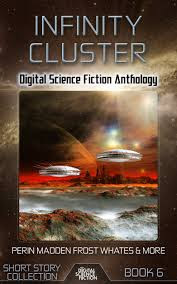 The bulk of my recent sales and publications, though, belong to Digital Fiction Publishing and its growing number of imprints. In fact, given that Digital is also the home of The Sign in the Moonlight and Other Stories, it's fair to say that they've now published far more of my short fiction than any other market, and there's more on the way. Late last year, my The Painted City came out as a solo e-book, and has since been collected as part of the delightfully-named Infinity Cluster anthology - one that for once I've read in a timely fashion, and wouldn't hesitate to recommend. In the meantime, I've sold a couple more reprint stories to Digital Science Fiction, Dancing in the Winter Rooms and Passive Resistance, while the Digital Fantasy Fiction imprint has picked up my Black Horticulture.
The bulk of my recent sales and publications, though, belong to Digital Fiction Publishing and its growing number of imprints. In fact, given that Digital is also the home of The Sign in the Moonlight and Other Stories, it's fair to say that they've now published far more of my short fiction than any other market, and there's more on the way. Late last year, my The Painted City came out as a solo e-book, and has since been collected as part of the delightfully-named Infinity Cluster anthology - one that for once I've read in a timely fashion, and wouldn't hesitate to recommend. In the meantime, I've sold a couple more reprint stories to Digital Science Fiction, Dancing in the Winter Rooms and Passive Resistance, while the Digital Fantasy Fiction imprint has picked up my Black Horticulture.I remember saying the last time I discussed short fiction, back in October of last year, that the strong spell of sales and publications I was having couldn't possibly last; looking back now, I can only feel immensely grateful that it's gone on for at least a little longer. I can't remember a time when so much work I was really proud of was being picked up and published at such a rate. Sooner or later it's bound to dry up - who knows, perhaps it already has? - but in the meantime it's been a lot of fun.
Published on March 07, 2016 09:53
Short Story News - March 2016
 It's been a while since I recapped any news on the short story front, perhaps because I've been distracted by having an entire collection of the things out. But while the release of The Sign in the Moonlight and Other Stories at the end of the last month - available from Amazon UK and Amazon US, amongst other places! - has certainly been the biggest thing happening, it's been by no means the only one.
It's been a while since I recapped any news on the short story front, perhaps because I've been distracted by having an entire collection of the things out. But while the release of The Sign in the Moonlight and Other Stories at the end of the last month - available from Amazon UK and Amazon US, amongst other places! - has certainly been the biggest thing happening, it's been by no means the only one.There is, for example, the publication - as cover story, no less! - of my first and so far only stab at crime short fiction, Step Light, in the prestigious Alfred Hitchcock Mystery Magazine. I remain completely gobsmacked that this ever happened, it seemed like a huge risk dipping my toes into a genre I had no experience of and it's hard to imagine how it could possibly have worked out any better.
(Though, if you should ever want to suck all the fun out of having a story published in a well-respected magazine for someone, do what some complete stranger did to me and message them to point out that it was full of mistakes. For maximum fun-sucking, make sure to be as blunt as possible, and to not tell them what those mistakes actually were.)
Meanwhile, at the end of last year, A Killer of Dead Men marked my second appearance in the ever-wonderful Beneath Ceaseless Skies, and my second tale following the adventures of master-assassin Otranto Onsario: you can read it here or listen to it here, but I'd strongly recommend opting for the latter because it's a great rendition. Still on the dark fantasy front, one of my personal favourites stories, The Magpie of Souls, got picked up by new market Cosmic Roots and Eldritch Shores. This is the tale of two archetypes, the evil sorcerer and the heroic warrior, coming face to face with each other and their own natures and discovering that perhaps they've turned out to be very different people to what they once intended. It should be out by the time you read this, and though you'll need to subscribe, doing so will only set you back a modest $12 for this first year. Meanwhile, another recently appeared market, Liminal Stories, picked up my incredibly odd science fiction story Team Invasion - seriously, this is the oddest thing I've written in years - and Golgotha, an historical horror story of sorts, is set to appear in the upcoming Mysterion anthology.
 The bulk of my recent sales and publications, though, belong to Digital Fiction Publishing and its growing number of imprints. In fact, given that Digital is also the home of The Sign in the Moonlight and Other Stories, it's fair to say that they've now published far more of my short fiction than any other market, and there's more on the way. Late last year, my The Painted City came out as a solo e-book, and has since been collected as part of the delightfully-named Infinity Cluster anthology - one that for once I've read in a timely fashion, and wouldn't hesitate to recommend. In the meantime, I've sold a couple more reprint stories to Digital Science Fiction, Dancing in the Winter Rooms and Passive Resistance, while the Digital Fantasy Fiction imprint has picked up my Black Horticulture.
The bulk of my recent sales and publications, though, belong to Digital Fiction Publishing and its growing number of imprints. In fact, given that Digital is also the home of The Sign in the Moonlight and Other Stories, it's fair to say that they've now published far more of my short fiction than any other market, and there's more on the way. Late last year, my The Painted City came out as a solo e-book, and has since been collected as part of the delightfully-named Infinity Cluster anthology - one that for once I've read in a timely fashion, and wouldn't hesitate to recommend. In the meantime, I've sold a couple more reprint stories to Digital Science Fiction, Dancing in the Winter Rooms and Passive Resistance, while the Digital Fantasy Fiction imprint has picked up my Black Horticulture.I remember saying the last time I discussed short fiction, back in October of last year, that the strong spell of sales and publications I was having couldn't possibly last; looking back now, I can only feel immensely grateful that it's gone on for at least a little longer. I can't remember a time when so much work I was really proud of was being picked up and published at such a rate. Sooner or later it's bound to dry up - who knows, perhaps it already has? - but in the meantime it's been a lot of fun.
Published on March 07, 2016 09:53
February 28, 2016
Patchwerk News and Reviews
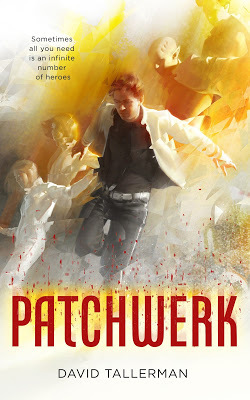 It's hard to believe that it's been more than a month since Patchwerk came out; it seems like it happened last week. Mostly for that reason, I've been a bit remiss in talking about it here, and also completely oblivious to just how much me and other people were talking about it elsewhere.
It's hard to believe that it's been more than a month since Patchwerk came out; it seems like it happened last week. Mostly for that reason, I've been a bit remiss in talking about it here, and also completely oblivious to just how much me and other people were talking about it elsewhere.There have, for instance, been quite a lot of reviews. And the vast majority have been positive, too; all except one, in fact, which - and I swear I'm not making this up - I now can't find. Anyway, what's perhaps more important is that the general response seems to be varying between quite and very positive. For example, Publisher's Weekly suggested that Patchwerk "throws open a surreal and suspenseful hall of science fiction mirrors, and readers will enjoy watching Florrian smash through them all." SF Bluestocking, despite a few reservations, described it as "a complete and mostly pleasant surprise" and an "an interestingly experimental work". We The Nerdy gave up half way through their first reading and then revisited it, but still felt that Patchwerk was "a pretty fun little scifi story with solid action and a likeable protagonist" and still gave it 7.5 out of 10.
Back on a definitely positive note, SF Signal said that "it’s no small feat to write about the multiverse without confusing the reader, but Tallerman manages to do just that. I love the detailed “worlds” that each iteration inhabits, and not only is it an exciting read, the characters, which could have been two dimensional in order to facilitate the story, are more than that." Elsewhere, Skiffy and Fanty suggested that "Tallerman does a great job of both narrowing the scope of the conflict ... and ... making it seem that the scope of the conflict is limitless. It’s an excellent balancing act", while Strange Alliances felt that "the story works extremely well but only because of David Tallerman’s competence as an author to keep it all together and continue to intrigue." (Aw!) Black Girl Nerds had a couple of issues but nevertheless felt that Patchwerk was "a very interesting read" and The Exploding Spaceship concluded that "Tallerman does an excellent riff on a clichéd plot device by turning it on its head. It is a very cleverly written and plotted story." Overall, though, my favourite quote has to be from Megan Leigh's in-depth review at Pop-verse - that "...this is what science fiction writing should be."
Although, Andrew Knighton's claim that Patchwerk is the anti-Sliders comes a close second.
Elsewhere, I've been talking a great deal about the book - or in a couple of cases, failing entirely to talk about it. On that note there were my two Tor.com blog posts, one of which involved praising Ian Sales's splendid conclusion to his Apollo Quartet, All That Outer Space Allows, and the other of which descended into my usual compulsive airing of my obsession with nineties anime! At least I managed to stay on topic at SF Signal, talking about some of my favourite reality-bending genre fiction in an article titled Teasing the Seams of Reality. I've also done a few interviews, swapping thoughts with My Bookish Ways about a whole bunch of stuff and settling once and for all with Andy Knighton who would win in a fight between Tolkien and Asimov. (Hint: it wouldn't be Tolkien.) I also did one of those old-style talky interviews with Mahvesh Murad of Midnight in Karachi, which once again ending up going spectacularly off-topic and, thanks to my crummy laptop, sounds like I was talking from the bottom of a well.
So if you haven't picked up a copy of Patchwerk yet, there's plenty of information out there to help you decide whether it's worth a look. (It totally is.) Or, if you wanted to wait, in a couple of weeks the fourth Tor.com bundle will be out, containing not only Patchwerk but Emily Foster's The Drowning Eyes and Matt Wallace's Lustlocked. Alternatively, if you're really quick, you can win Patchwerk, along with all three Damasco books, here. (Admittedly, at time of posting you have all of three hours!) Lastly, you can always just buy it the old fashioned way - from Amazon UK here or Amazon US here.
On a final note ... it may seem like a small thing, but reviews in places like Amazon and Goodreads can make all the difference between a book's success or failure, and whether I get to keep writing for a living depends in great part upon how well this little book does. So if you've read and enjoyed Patchwerk then please think about taking a minute to slap up a review somewhere. Trust me, every bit helps.
Published on February 28, 2016 12:53
February 21, 2016
The Sign in the Moonlight and Other Stories, Finally Out
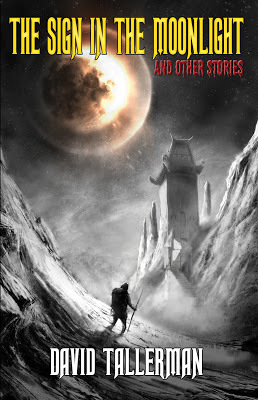 It lives and dies and lives again! Beat it with sticks and it laughs maniacally at you! Drive a stake through its heart and you'll only make it come back stronger! Tickle its tummy and it will bite your fingers and try hard to scratch you with its back legs, in a way that seems awfully cute until you realise just how badly you're bleeding!
It lives and dies and lives again! Beat it with sticks and it laughs maniacally at you! Drive a stake through its heart and you'll only make it come back stronger! Tickle its tummy and it will bite your fingers and try hard to scratch you with its back legs, in a way that seems awfully cute until you realise just how badly you're bleeding!I'm talking, of course, about my short story collection The Sign in the Moonlight and Other Stories, which has been under construction for the sort of time periods normally reserved for medieval cathedrals. For a very long time indeed it was supposed to be coming out from Spectral Press, and there was a point where that seemed awfully close to happening - until suddenly it wasn't, because I'd withdrawn it after one missed deadline too many, and then because Spectral had closed its doors with the announcement of considerable unpaid debts.
This was gutting, but it was also probably the single best thing that happened to the book, all told. Because if it hadn't been for that, it would never have found its way into the hands of Michael Wills and Digital Fiction Publishing, and the levels of effort and commitment that Michael has put into getting this project shipshape - in a fairly trivial amount of time, mind you - are just about incalculable. In early January it appeared that Sign in the Moonlight might finally have breathed its last, and now here we are, it's not even the end of February, and lo and behold! We have us a book.
What sort of a book, you might ask? At least if you've somehow missed all of my dozen posts talking about it before now. Well, it's the first collection of my short fiction, focusing entirely upon horror and dark fantasy and for the most part a particular brand of those genres, at that. These are weird tales full of ghosts, monsters and eldritch horrors, heavily influenced by the likes of Machen, Poe, Lovecraft and Wells - though with some distinctly modern twists, because after all it's me writing it and not a bunch of guys who've been dead for decades. So, for instance, we get a haunting in the shadow of one of the great tragedies of the twentieth century, some distinctly black humour at the expense of the poor, beleaguered child who thinks Innsmouth might make an ideal holiday destination, an off-page cameo from a certain Mr Aleister Crowley, not to mention a brand new novelette treating upon the real-life horrors of the First World War.
Moreover, all that is elegantly illustrated by Duncan Kay, he of that-cover-up-there fame, not to mention ably introduced by Fantasy superstar Adrian Tchaikovsky. The Sign in the Moonlight and Other Stories ... it's been a long time coming, but it's out now, and you can buy it in e-book or print in the US here and in the UK here. Oh, and it's heavily discounted for these first few days, which means that you can pick it up for the practically nonexistent price of 99 cents or 99 pence until this time next week.
Here's the TOC:
The Burning RoomThe Facts in the Case of Algernon Whisper's KarmaThe Desert ColdWar of the RatsThe Sign in the MoonlightMy Friend Fishfinger by Daisy Aged 7Prisoner of PeaceThe Door Beyond the WaterCaretaker in the Garden of DreamsA Twist Too FarThe Untold GhostA Study in Red and WhiteA Stare From the DarknessThe Way of the Leaves
Published on February 21, 2016 10:09
February 15, 2016
February is Not National Novel Writing Month
A few weeks ago I was determined - for reasons I'm sure we'll come back to one of these days - to try and write the first draft of a novel in the space of about a month. Like, the whole thing, start to finish, in one month or thereabouts. Wouldn't that be something? Maybe not necessarily a good something, but it would certainly be one to cross off the bucket list, assuming that your bucket list consisted primarily of masochistic writing challenges. Which is to say that I realised it wasn't such a great idea, for me or for the book, and one month ended up spreading into just under two. That still being, I feel the need to point out, pretty damn quick for writing the entire first draft of a novel! I mean, at times like this I need to remind myself that the first draft of Giant Thief took me something like three years...
If we're talking in National Novel Writing Month terms, however, I should be more than up to the challenge. This last couple of weeks I've been writing between 2000 and 3000 words a day, and that's set to err towards the higher end for the rest of the month, now that the final proofs of The Sign in the Moonlight and Other Stories are out of the way. My capacity for getting the words down has been steadily rising ever since I began writing full time, with no noticeable drop-off in quality, and I'm also getting more comfortable with writing flat out for longer periods, at least partly because I'm getting better at organising my days. My pre-planning has also improved by leaps and bounds, to the point where I'm able to just get on and write without too much risk of growing severely stuck or having to go back and make significant changes. On which front, I'm also much more confident in my ability to remember what I got wrong in the first draft and fix it in the second. In short, its definitely been a confluence of factors that's brought my daily word count up to this level - which, as a friend recently pointed out, is still small potatoes for a lot of writers, but for me is quite an achievement.
I suppose that I'm mentioning this, here and now, because a small part of me has been wondering ever since I first heard of NaNoWriMo whether I'd ever be capable of writing a novel in a month - or rather of writing 50'000 words in a month, since as I've inadvertently illustrated, the two are far from being necessarily the same thing. By the end of February, unless something goes terribly wrong, it looks as though I'll have proved to myself that the answer is yes - with the sizable proviso that it took me years of honing my technique, not to mention packing in my day job, to get to this point.
I'm not sure what the moral is here, except to say that I'm a little bit more convinced than I already was that if you're serious about becoming a professional writer then NaNoWriMo isn't the most productive of exercises. Because, yes, I could have just written this fast eight or whatever years ago, when I was just starting out, and maybe I could have even managed 50'000 words in a month without my face exploding, but would I have learned even a tenth of what I've learned doing it the long way? I think not. Which isn't to say that NaNoWriMo can't be a meaningful or a fun exercise - plenty of people have assured me that it is, and why would they lie? - just that I'm not persuaded it's a shortcut past years of graft, because I'm not convinced that any such shortcut exists. Then again, perhaps I'm the only one who ever imagined it was supposed to be, and I'm entirely missing the point.
On a side note, in the actual National Novel Writing Month, November, I'll be writing - assuming my schedule hasn't changed in the meantime, of course - a measly forty thousand words or so, meaning that, in the first year I might have seriously considered giving it a go, I still won't. But who knows? Maybe in 2017!
If we're talking in National Novel Writing Month terms, however, I should be more than up to the challenge. This last couple of weeks I've been writing between 2000 and 3000 words a day, and that's set to err towards the higher end for the rest of the month, now that the final proofs of The Sign in the Moonlight and Other Stories are out of the way. My capacity for getting the words down has been steadily rising ever since I began writing full time, with no noticeable drop-off in quality, and I'm also getting more comfortable with writing flat out for longer periods, at least partly because I'm getting better at organising my days. My pre-planning has also improved by leaps and bounds, to the point where I'm able to just get on and write without too much risk of growing severely stuck or having to go back and make significant changes. On which front, I'm also much more confident in my ability to remember what I got wrong in the first draft and fix it in the second. In short, its definitely been a confluence of factors that's brought my daily word count up to this level - which, as a friend recently pointed out, is still small potatoes for a lot of writers, but for me is quite an achievement.
I suppose that I'm mentioning this, here and now, because a small part of me has been wondering ever since I first heard of NaNoWriMo whether I'd ever be capable of writing a novel in a month - or rather of writing 50'000 words in a month, since as I've inadvertently illustrated, the two are far from being necessarily the same thing. By the end of February, unless something goes terribly wrong, it looks as though I'll have proved to myself that the answer is yes - with the sizable proviso that it took me years of honing my technique, not to mention packing in my day job, to get to this point.
I'm not sure what the moral is here, except to say that I'm a little bit more convinced than I already was that if you're serious about becoming a professional writer then NaNoWriMo isn't the most productive of exercises. Because, yes, I could have just written this fast eight or whatever years ago, when I was just starting out, and maybe I could have even managed 50'000 words in a month without my face exploding, but would I have learned even a tenth of what I've learned doing it the long way? I think not. Which isn't to say that NaNoWriMo can't be a meaningful or a fun exercise - plenty of people have assured me that it is, and why would they lie? - just that I'm not persuaded it's a shortcut past years of graft, because I'm not convinced that any such shortcut exists. Then again, perhaps I'm the only one who ever imagined it was supposed to be, and I'm entirely missing the point.
On a side note, in the actual National Novel Writing Month, November, I'll be writing - assuming my schedule hasn't changed in the meantime, of course - a measly forty thousand words or so, meaning that, in the first year I might have seriously considered giving it a go, I still won't. But who knows? Maybe in 2017!
Published on February 15, 2016 12:36
February 9, 2016
Book Ramble: In the Shadow of The Shadows of the Apt
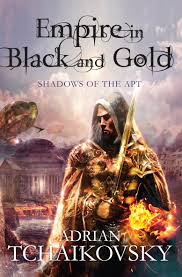 I really don't read epic fantasy.
I really don't read epic fantasy.This has nothing to do with how much I like or don't like epic fantasy, but everything to do with a lack of hours in the day, or at least a desire to read as diversely as I can in the limited time that I have.
So it was that when I picked up Adrian Tchaikovsky's debut novel Empire in Black and Gold, it wasn't with any intention of reading beyond that point. I didn't know Adrian back then, I wasn't familiar with his work because I was hopelessly ignorant of the publishing scene in general, but he'd been kind enough to provide a blurb for Giant Thief and I had an idea of thanking him in a small way by picking up one of his books. It seemed like about the least I could do; but not being a reader of epic fantasy, I fully assumed that that would be the end of it.
Yet here we are, however many years later, and I just finished Seal of the Worm, book ten in the series that Empire began. So clearly something went very wrong. Or very right. Or perhaps a bit of both.
First up, I feel obliged to point out, if only to myself, that The Shadows of the Apt isn't really epic fantasy at all. I mean, yes, it's epic and yes it's fantasy, but ... okay, maybe it sort of is. But that's about the lowest level it's operating on; epic fantasy is SotA when it's idling, and how many such series can claim that? It's the premise, that's the thing: a reality where humans have acquired what amount to superpowers by emulating various insect species, and then are further divided into the technologically able Apt and the magically inclined Inapt, who understand so little of machinery that they can't so much as pull the trigger of a crossbow. It's a setting that works equally well as science-fiction and fantasy, and SotA treads a hair-thin line between the two, but those twin central concepts have advantages well beyond that. They lead to a world, for example, that can still offer surprises all the way into its tenth book, as we're drip-fed new insect-kinden with new, crazy powers, but also entire new cultures, each detailed with loving affection. Those two marvelous notions collide against each other in endlessly interesting ways, and while perhaps neither alone could warrant seven thousand and some words, somehow the two in combination provide an all but limitless scope.
(I'll admit it here, a little shamefacedly: I got to the end of book ten and found myself wanting more.)
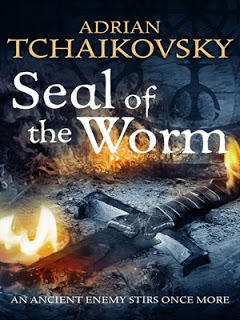 If that was all SotA had going for it, however, I suspect I'd have drifted away, a little sadly, somewhere round about book four or five. The thing is, The Shadows of the Apt is also an alternate history of about two hundred years of human progress, twisted and reshuffled but still potently reminiscent of our own recent triumphs and misdeeds. At the risk of slight spoilers, the world of the Apt sees its own blitz, its own industrial revolution, even its own terrible equivalent of the holocaust. And only as I got towards the end of the series did I fully appreciate how much that was what kept me reading: beneath the magic, the fantasy, the intriguing alternate technologies, there is in these ten books a deconstruction of our own development as a species, at our worst and our best. The results are sometimes devastating and sometimes hopeful; Adrian's bug-people aren't quite us, and often they avoid our mistakes, or else manufacture even worse horrors of their own. Still, there was rarely a point when I felt I was reading a work with nothing to say about my own reality and its bloody, tragic, occasionally marvelous history. In the end, these books aren't escapism; instead, they're a side step into a might-have-been world with all the frailties and potentialities of our own, one that in turn has no end of things to say about the ways we've chosen to make ourselves and each other suffer, how we might have done better, how we might do yet.
If that was all SotA had going for it, however, I suspect I'd have drifted away, a little sadly, somewhere round about book four or five. The thing is, The Shadows of the Apt is also an alternate history of about two hundred years of human progress, twisted and reshuffled but still potently reminiscent of our own recent triumphs and misdeeds. At the risk of slight spoilers, the world of the Apt sees its own blitz, its own industrial revolution, even its own terrible equivalent of the holocaust. And only as I got towards the end of the series did I fully appreciate how much that was what kept me reading: beneath the magic, the fantasy, the intriguing alternate technologies, there is in these ten books a deconstruction of our own development as a species, at our worst and our best. The results are sometimes devastating and sometimes hopeful; Adrian's bug-people aren't quite us, and often they avoid our mistakes, or else manufacture even worse horrors of their own. Still, there was rarely a point when I felt I was reading a work with nothing to say about my own reality and its bloody, tragic, occasionally marvelous history. In the end, these books aren't escapism; instead, they're a side step into a might-have-been world with all the frailties and potentialities of our own, one that in turn has no end of things to say about the ways we've chosen to make ourselves and each other suffer, how we might have done better, how we might do yet.There's plenty more I could talk about here - Adrian's Miyazaki-like refusal to give us villains who are anything less than fully comprehensible human beings certainly warrants an essay all of its own - but in the end it's perhaps enough to just point out that these are tremendously good books, works of exceeding cleverness and imagination, and you should absolutely give them a go if you haven't already.
Just be prepared for the fact that once you start, it might be a while before you stop...
Published on February 09, 2016 12:07
January 31, 2016
The Sign in the Moonlight and Other Stories Finds New Home
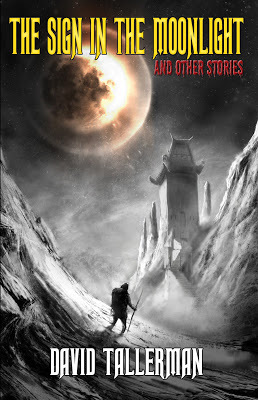 So, the last time I talked about my collection The Sign in the Moonlight and Other Stories - collecting horror and dark fantasy stories from basically all across my career, and every one of them illustrated by the super-talented Mr Duncay Kay - things were looking pretty bleak. Having spent some considerable time putting the project together with Simon Marshall-Jones and Spectral Press, I'd made the decision to withdraw the book on the back of delays and other problems that would, literally the following day, come to a head in such catastrophic fashion that for a few days it seemed like all the particular corner of the internet I inhabit was talking about.
So, the last time I talked about my collection The Sign in the Moonlight and Other Stories - collecting horror and dark fantasy stories from basically all across my career, and every one of them illustrated by the super-talented Mr Duncay Kay - things were looking pretty bleak. Having spent some considerable time putting the project together with Simon Marshall-Jones and Spectral Press, I'd made the decision to withdraw the book on the back of delays and other problems that would, literally the following day, come to a head in such catastrophic fashion that for a few days it seemed like all the particular corner of the internet I inhabit was talking about.That was, I suppose, only a couple of weeks ago, but it seems like a lifetime; a great deal has happened since. Most of that is thanks to Michael Wills over at Digital Fiction Publishing, who has put in a quite extraordinary amount of effort into getting the project not only back on its feet but fighting fit and, as of a couple of days ago, pretty much ready for release. I mean, seriously, you wouldn't believe just how quickly this thing went from "oh crap, it looks like we now don't have a publisher for this book we've invested two whole years into" to "wait, is that finished?" I shouldn't have been surprised because I've worked with Michael quite a bit now in regards to his imprint Digital Science Fiction, but this was still all rather dizzying. I mean, we now have a completed book, and it's coming out next month. That's pretty cool, right? Oh, and not to forget, we also have an exciting new cover design, which is over there on the right.
Hopefully, though, that's not all the news. I'm in talks over the possibility of hardback and audiobook editions, which may or may not come to something in the next few days. Fingers crossed, right? And in the meantime, if anyone's interested in a review copy of The Sign in the Moonlight and Other Stories then feel free to drop me a note at the address on the contact page. I'm biased, obviously, but I'm starting to feel like this little book might just be something kind of special.
Published on January 31, 2016 12:04
January 24, 2016
Film Ramble: Drowning in Nineties Anime, Pt. 8
A particularly strange batch this time around, as I delve into some corners of nineties anime that would probably have been better left unexplored. Still, it hasn't all been doom and gloom and horrifying tentacle sex. This session's also managed to turn into something of a Masamune Shirow retrospective, even if I've failed to cover my personal favourite adaptation of his work and one of my all-time favourite films, Mamoru Oshii's Ghost in the Shell.
I guess that one gets saved for a special occasion; I haven't yet given up on the hope of doing one of these where everything is actually good. But in the meantime it's the usual case of taking the great with the mediocre and utterly awful, and so we have: Urotsukidoji: Legend of the Overfiend, New Dominion Tank Police, Street Fighter 2: The Movie and the very first adaption of Appleseed...
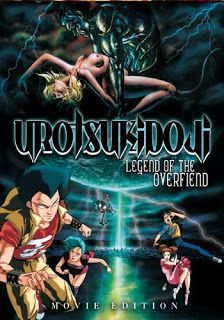 Urotsukidoji: Legend of the Overfiend, 1989, Hideki Takayama
Urotsukidoji: Legend of the Overfiend, 1989, Hideki Takayama
Legend of the Overfiend is notorious for one reason: it's the film that introduced the notion of tentacle rape as a genre to the West. And for that selfsame reason I didn't exactly rush to see it. I mean, to say the absolute sodding least.
You might say that a completionist spirit led me here, but actually I think I'd just convinced myself - having failed to be shocked by so much anime that was probably shocking in its day - that Legend probably wasn't half as bad as its reputation. And in a sense, I was right. For a start, the animation is pretty dreadful, which goes a great way to declawing the interminable scenes of violence, be it sexual or otherwise. And for another start, it's achingly stupid and just so basically bad in so many fundamental ways - script, direction, animation, stuff like that - that it's difficult to take seriously.
Still, it's a pretty damn sordid and demoralizing experience all told. I've seen the film defended on the grounds that it's more misanthropic than it is misogynistic, and maybe there's a grain of truth to that, but you know what? You don't see any men getting raped anywhere, even if quite a few do get exploded. No, what really made the film all but unwatchable for me was the sense that no one amongst the makers understood on any level that women were people, that they might conceivably serve some function that didn't involve sex or murder, and - somehow worst of all - that the horrendousness it portrays would leave any meaningful impact. I mean, if you can't craft characters who react to their experiences from scene to scene then that's just plain bad writing, regardless of how depressingly horrid it might make your creation.
But let's divert just ever so slightly to admit that I didn't altogether hate every minute of Legend of the Overfiend. The thing is, like so much of what I've talked about here, this was actually an OVA originally, and things do noticeably pick up in the last third. In fact, once the titular overfiend appeared and the filmmakers tired of throwing about rape and death to little actual purpose and the animation quality picked up to a startling degree, I was shocked to discover that I was kind of entertained. I mean, not so much that it erased my basic loathing of the first two thirds, but enough to surprise me at least, and enough to make me think that if the makers hadn't been so determined to construct something rancid and shocking then there was the basis of a solid story in here somewhere.
I suppose I thought on some level that I needed to see Legend of the Overfiend. Now I'm more of the opinion that no one really needs to see Legend of the Overfiend. It's basically vile, and only occasionally does that vileness take imaginative forms that give it some value as a work of horror. Or to put it another way, just because something does a thing first, that does not necessarily make that thing worth doing.
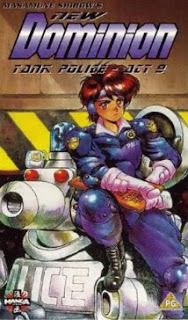 New Dominion Tank Police, 1993, dir: Noboru Furuse
New Dominion Tank Police, 1993, dir: Noboru Furuse
I actually have this and its preceding OVA on VHS, which makes me feel kind of old. Anyway, I remember not rating it greatly the first time around, having come to it on the back of Dominion Tank Police, a fact that befuddled me slightly on a rewatch because it's really a lot of fun. Tank Police in whatever its incarnation is a creation of the famed Masamune Shirow, known also for the ever-expanding Appleseed franchise but primarily for Ghost in the Shell, and generally a man who was a name to conjure with in the early nineties. The Tank Police universe sees him in light-hearted and broadly satiric mode, with a story set in the unimaginably distant future of 2016 and the fictional city of Newport, Japan, in which crime and terror levels are perceived to have escalated to such an absurd degree that the police have deemed arming themselves with tanks a reasonable measure.
Because that would never happen, right?
Which is to say that New Dominion Tank Police has lost a little of its edge in the nearly three decades since its original release, as reality caught up with and then overtook it in increasingly depressing ways - but that actually makes it easier to enjoy, so let's not focus entirely on the negatives. New Dominion Tank Police is, if I remember rightly, a lot more grounded than the original miniseries was, and content to coast off parodying cop shows and other cliches, but there's still plenty to enjoy here, and a couple of the six episodes are genuinely excellent. The animation is also terrific in places, particularly the opening sequence, and generally I found myself enjoying it a great deal more than I'd expected to. It's frequently funny, some of the action is terrific, the characters are likable and its only real weakness is a saggy arc plot with some lackluster corporate villains. If you can find it cheaply, as you probably can, then I wouldn't hesitate to recommend it, but particularly if you have any affection for the Patlabor TV series, which it closely resembles.
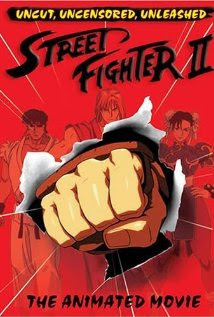
Street Fighter 2: The Movie, 1994, dir: Gisaburo Sugii
If you imagine that an anime movie should exist of the (at the time) hugely popular video game Street Fighter 2, and if you imagine that huge quantities of money were thrown at it, and if you further imagine that its main goal was not to tell a coherent story with rich, three dimensional characters but to cram as much Street Fighter 2-ishness as possible into an hour and a half run-time then - congratulations! - you've probably imagined something an awfully lot like Street Fighter 2: The Movie. The story, if one can so abuse the word, involves the villainous Bison stalking the various fighters from the series with his evil organisation Shadowlaw, in a bid to find and kidnap the very greatest and brainwash them into serving as his assassins. (Why he doesn't just kidnap the lot of them, and why he's going to so much trouble when he isn't exactly short of assassins, and indeed why Bison doesn't just assassinate people himself when he's practically unkillable, are questions the film doesn't even think about beginning to answer.)
So, yes, it's pretty stupid, and a thinly veiled excuse to give every character their moment and an opportunity, however tenuous, to show off their moves. What rescues it, somewhat, is the standard of the animation, which is largely phenomenal, and in particular the backgrounds, which are probably the most beautiful and detailed I've ever seen - and should have been put to the service of a much better film. The thing is, unless you're absolutely obsessed with a video game from more than two decades ago then a story strung together from fight after fight pales quickly. And it helps not at all that the only character who even threatens to have an arc, Chun-Li, gets treated scummily on account of her gender: having suffered through a gratuitous shower scene and then been nearly murdered in her underwear (frustratingly the film's best fight scene, thanks to a real sense of danger lacking elsewhere) she spends the entire second half in a coma. I mean, seriously? With two female characters to work with, that was where they chose to go? Nineties anime, sometimes you test me sorely.
I'd heard so many good things about Street Fighter 2: The Movie that I'd hoped there might be something there to appeal to even a non-fan like myself. And there kind of is - that lavish animation, those gorgeous backdrops - but all told, it wasn't enough. Still, it's hard not to recommend just a little, it has a definite nostalgic charm and it really does look wonderful in places. Just don't expect even the faintest glimmer of a plot, that's all I'm saying.
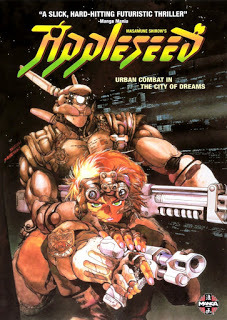 Appleseed, dir: Kazuyoshi Katayama, 1988
Appleseed, dir: Kazuyoshi Katayama, 1988
What do you know, it's another Masamune Shirow adaptation; didn't I tell you he was everywhere? Appleseed hails from the same year as the original Dominion Tank Police, and was itself also an OVA, though the version that Manga would eventually pass off had been - quelle surprise! - re-edited so that it looked like a movie, so long as your expectations of what a movie involved didn't extend to it being more than about an hour in length. Or, you know, not awfully animated.
No, that's harsh. Well, it isn't particularly - there's certain animation in Appleseed, such as the simple act of people walking, that's amongst the worst I've seen anywhere in anime - but I feel like it should be better than it is because, to my considerable astonishment, this represents early work by studio Gainax, who I've mentioned glowingly here before. There are glimpses of talent, it has to be said, particularly when it comes to bringing Shirow's uniquely recognisable mecha designs to life. But overall, Appleseed looks pretty shoddy, even by 1988 standards, and the score - full of tuneless eighties noodling - is flat out terrible.
So with not much to distinguish Appleseed on the technical front, we find ourselves left to judge largely on its story. The translation is dismal and needlessly sweary - because Manga video - and so it's hard to judge the plot entirely on its own merits, but even with that caveat there's not a great deal going on here. There's the core of an intriguing narrative, one that probes the notion of a flawed Utopian society and of benevolent dictatorships, but then that intriguing narrative is Shirow's original Manga, which this adapts with little apparent understanding of its subtleties. As it stands, there's not much going on to appeal to the intellect, and what there is gets quickly hamstrung by a script that seems deeply muddy on its own themes. Much hangs on the notion that Appleseed's futuristic paradise Olympus is a gilded cage, but the film fails to sell that notion at all, and in its absence it's not easy to understand why anyone would conspire so hard to blow up the last properly inhabitable place on the planet.
Where does that leave us? Well, Appleseed certainly isn't horrible. Passable is probably more the word. And to be fair, it kept me fairly engaged throughout its running time, when I wasn't cringing at the stupid translation or the wonky animation. Um. No, this isn't a recommendation, isn't? Probably one for hardcore Shirow fans and admirers of the sort of sci-fi shows where people in the far-distant future are still using faxes, I'm afraid.
-oOo-
I talked up top about taking the good with the dross, but this turned out to one of those basically terrible entries. I swear, I don't plan this stuff at all. Well, there's a fair chance that we'll do better next time around, with the caveat that I still have the sequel to Legend of the Overfiend to watch the next time I'm filled with self-hatred and a willingness to make my eyeballs want to retreat into my skull. And, you know, Dominion Tank Police was pretty fun, so that's something.
[Other posts in this series: Part 1, Part 2, Part 3, Part 4, Part 5, Part 6, Part 7]
I guess that one gets saved for a special occasion; I haven't yet given up on the hope of doing one of these where everything is actually good. But in the meantime it's the usual case of taking the great with the mediocre and utterly awful, and so we have: Urotsukidoji: Legend of the Overfiend, New Dominion Tank Police, Street Fighter 2: The Movie and the very first adaption of Appleseed...
 Urotsukidoji: Legend of the Overfiend, 1989, Hideki Takayama
Urotsukidoji: Legend of the Overfiend, 1989, Hideki TakayamaLegend of the Overfiend is notorious for one reason: it's the film that introduced the notion of tentacle rape as a genre to the West. And for that selfsame reason I didn't exactly rush to see it. I mean, to say the absolute sodding least.
You might say that a completionist spirit led me here, but actually I think I'd just convinced myself - having failed to be shocked by so much anime that was probably shocking in its day - that Legend probably wasn't half as bad as its reputation. And in a sense, I was right. For a start, the animation is pretty dreadful, which goes a great way to declawing the interminable scenes of violence, be it sexual or otherwise. And for another start, it's achingly stupid and just so basically bad in so many fundamental ways - script, direction, animation, stuff like that - that it's difficult to take seriously.
Still, it's a pretty damn sordid and demoralizing experience all told. I've seen the film defended on the grounds that it's more misanthropic than it is misogynistic, and maybe there's a grain of truth to that, but you know what? You don't see any men getting raped anywhere, even if quite a few do get exploded. No, what really made the film all but unwatchable for me was the sense that no one amongst the makers understood on any level that women were people, that they might conceivably serve some function that didn't involve sex or murder, and - somehow worst of all - that the horrendousness it portrays would leave any meaningful impact. I mean, if you can't craft characters who react to their experiences from scene to scene then that's just plain bad writing, regardless of how depressingly horrid it might make your creation.
But let's divert just ever so slightly to admit that I didn't altogether hate every minute of Legend of the Overfiend. The thing is, like so much of what I've talked about here, this was actually an OVA originally, and things do noticeably pick up in the last third. In fact, once the titular overfiend appeared and the filmmakers tired of throwing about rape and death to little actual purpose and the animation quality picked up to a startling degree, I was shocked to discover that I was kind of entertained. I mean, not so much that it erased my basic loathing of the first two thirds, but enough to surprise me at least, and enough to make me think that if the makers hadn't been so determined to construct something rancid and shocking then there was the basis of a solid story in here somewhere.
I suppose I thought on some level that I needed to see Legend of the Overfiend. Now I'm more of the opinion that no one really needs to see Legend of the Overfiend. It's basically vile, and only occasionally does that vileness take imaginative forms that give it some value as a work of horror. Or to put it another way, just because something does a thing first, that does not necessarily make that thing worth doing.
 New Dominion Tank Police, 1993, dir: Noboru Furuse
New Dominion Tank Police, 1993, dir: Noboru FuruseI actually have this and its preceding OVA on VHS, which makes me feel kind of old. Anyway, I remember not rating it greatly the first time around, having come to it on the back of Dominion Tank Police, a fact that befuddled me slightly on a rewatch because it's really a lot of fun. Tank Police in whatever its incarnation is a creation of the famed Masamune Shirow, known also for the ever-expanding Appleseed franchise but primarily for Ghost in the Shell, and generally a man who was a name to conjure with in the early nineties. The Tank Police universe sees him in light-hearted and broadly satiric mode, with a story set in the unimaginably distant future of 2016 and the fictional city of Newport, Japan, in which crime and terror levels are perceived to have escalated to such an absurd degree that the police have deemed arming themselves with tanks a reasonable measure.
Because that would never happen, right?
Which is to say that New Dominion Tank Police has lost a little of its edge in the nearly three decades since its original release, as reality caught up with and then overtook it in increasingly depressing ways - but that actually makes it easier to enjoy, so let's not focus entirely on the negatives. New Dominion Tank Police is, if I remember rightly, a lot more grounded than the original miniseries was, and content to coast off parodying cop shows and other cliches, but there's still plenty to enjoy here, and a couple of the six episodes are genuinely excellent. The animation is also terrific in places, particularly the opening sequence, and generally I found myself enjoying it a great deal more than I'd expected to. It's frequently funny, some of the action is terrific, the characters are likable and its only real weakness is a saggy arc plot with some lackluster corporate villains. If you can find it cheaply, as you probably can, then I wouldn't hesitate to recommend it, but particularly if you have any affection for the Patlabor TV series, which it closely resembles.

Street Fighter 2: The Movie, 1994, dir: Gisaburo Sugii
If you imagine that an anime movie should exist of the (at the time) hugely popular video game Street Fighter 2, and if you imagine that huge quantities of money were thrown at it, and if you further imagine that its main goal was not to tell a coherent story with rich, three dimensional characters but to cram as much Street Fighter 2-ishness as possible into an hour and a half run-time then - congratulations! - you've probably imagined something an awfully lot like Street Fighter 2: The Movie. The story, if one can so abuse the word, involves the villainous Bison stalking the various fighters from the series with his evil organisation Shadowlaw, in a bid to find and kidnap the very greatest and brainwash them into serving as his assassins. (Why he doesn't just kidnap the lot of them, and why he's going to so much trouble when he isn't exactly short of assassins, and indeed why Bison doesn't just assassinate people himself when he's practically unkillable, are questions the film doesn't even think about beginning to answer.)
So, yes, it's pretty stupid, and a thinly veiled excuse to give every character their moment and an opportunity, however tenuous, to show off their moves. What rescues it, somewhat, is the standard of the animation, which is largely phenomenal, and in particular the backgrounds, which are probably the most beautiful and detailed I've ever seen - and should have been put to the service of a much better film. The thing is, unless you're absolutely obsessed with a video game from more than two decades ago then a story strung together from fight after fight pales quickly. And it helps not at all that the only character who even threatens to have an arc, Chun-Li, gets treated scummily on account of her gender: having suffered through a gratuitous shower scene and then been nearly murdered in her underwear (frustratingly the film's best fight scene, thanks to a real sense of danger lacking elsewhere) she spends the entire second half in a coma. I mean, seriously? With two female characters to work with, that was where they chose to go? Nineties anime, sometimes you test me sorely.
I'd heard so many good things about Street Fighter 2: The Movie that I'd hoped there might be something there to appeal to even a non-fan like myself. And there kind of is - that lavish animation, those gorgeous backdrops - but all told, it wasn't enough. Still, it's hard not to recommend just a little, it has a definite nostalgic charm and it really does look wonderful in places. Just don't expect even the faintest glimmer of a plot, that's all I'm saying.
 Appleseed, dir: Kazuyoshi Katayama, 1988
Appleseed, dir: Kazuyoshi Katayama, 1988What do you know, it's another Masamune Shirow adaptation; didn't I tell you he was everywhere? Appleseed hails from the same year as the original Dominion Tank Police, and was itself also an OVA, though the version that Manga would eventually pass off had been - quelle surprise! - re-edited so that it looked like a movie, so long as your expectations of what a movie involved didn't extend to it being more than about an hour in length. Or, you know, not awfully animated.
No, that's harsh. Well, it isn't particularly - there's certain animation in Appleseed, such as the simple act of people walking, that's amongst the worst I've seen anywhere in anime - but I feel like it should be better than it is because, to my considerable astonishment, this represents early work by studio Gainax, who I've mentioned glowingly here before. There are glimpses of talent, it has to be said, particularly when it comes to bringing Shirow's uniquely recognisable mecha designs to life. But overall, Appleseed looks pretty shoddy, even by 1988 standards, and the score - full of tuneless eighties noodling - is flat out terrible.
So with not much to distinguish Appleseed on the technical front, we find ourselves left to judge largely on its story. The translation is dismal and needlessly sweary - because Manga video - and so it's hard to judge the plot entirely on its own merits, but even with that caveat there's not a great deal going on here. There's the core of an intriguing narrative, one that probes the notion of a flawed Utopian society and of benevolent dictatorships, but then that intriguing narrative is Shirow's original Manga, which this adapts with little apparent understanding of its subtleties. As it stands, there's not much going on to appeal to the intellect, and what there is gets quickly hamstrung by a script that seems deeply muddy on its own themes. Much hangs on the notion that Appleseed's futuristic paradise Olympus is a gilded cage, but the film fails to sell that notion at all, and in its absence it's not easy to understand why anyone would conspire so hard to blow up the last properly inhabitable place on the planet.
Where does that leave us? Well, Appleseed certainly isn't horrible. Passable is probably more the word. And to be fair, it kept me fairly engaged throughout its running time, when I wasn't cringing at the stupid translation or the wonky animation. Um. No, this isn't a recommendation, isn't? Probably one for hardcore Shirow fans and admirers of the sort of sci-fi shows where people in the far-distant future are still using faxes, I'm afraid.
-oOo-
I talked up top about taking the good with the dross, but this turned out to one of those basically terrible entries. I swear, I don't plan this stuff at all. Well, there's a fair chance that we'll do better next time around, with the caveat that I still have the sequel to Legend of the Overfiend to watch the next time I'm filled with self-hatred and a willingness to make my eyeballs want to retreat into my skull. And, you know, Dominion Tank Police was pretty fun, so that's something.
[Other posts in this series: Part 1, Part 2, Part 3, Part 4, Part 5, Part 6, Part 7]
Published on January 24, 2016 11:18
January 18, 2016
Patchwerk is Out! Reality Explodes!
Patchwerk is finally out! Woo!
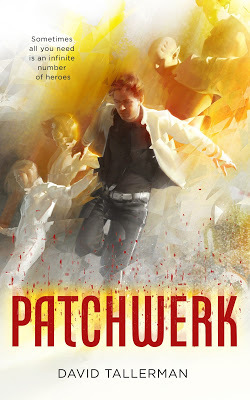
I mean, it will be tomorrow - that is, Tuesday the 19th of January. My first novella, my first time working with the mighty Tor.com - fingers crossed it won't be the last - and, now that I think about it, my first published long-form work of science fiction. Not that science fiction is precisely what Patchwerk is. But it's certainly what it starts as. Or is that saying too much?
An admission: it's very hard to talk about Patchwerk even slightly without spoilering it. The thing is, it starts out as one thing and ... but, no, better if you don't know that. You might just have to take my word on this one.
Or - hey! - here's the blurb, with actual information in it:
Fleeing the city of New York on the TransContinental atmospheric transport, Dran Florrian is traveling with Palimpsest - the ultimate proof of a lifetime of scientific theorizing.
When a rogue organization attempts to steal the device, however, Dran takes drastic action.
But his invention threatens to destroy the very fabric of this and all other possible universes, unless Dran - or someone very much like him-can shut down the machine and reverse the process.
So, basically, all of reality is at stake, and it's up to scientist / super-spy Dran Florrian (or, as the cover points out, a potential infinitude of people an awful lot like him) to put things back together again, before a revolutionary invention with a mind of its own and the keys to all of creation does something that everyone might regret.
Is that any clearer?
If not then perhaps some of the interviews, articles and whatnot that are out or coming up will shed some useful light. Though, I fear, probably not, because I've been being purposefully vague there too. In fact, I largely used the first of my articles with Tor.com to witter on about nineties anime some more, and managed not to mention Patchwerk once. My article on my favourite works that deal with plastic and alternate realities, up at SF Signal, is a lot more revealing, but even then only if you read between the lines a little. Perhaps the interviews I have coming up will prove more enlightening. Or hopefully all of this vagueness will somehow persuade you that you should a) pick up a copy of Patchwerk and find out what's going on for yourself and b) that you should come to it with as little foreknowledge as possible. And to end on a serious note, if you are planning to buy a copy then those early sales are absolutely crucial, so please, don't delay! I mean, who knows if reality will still be here tomorrow...

I mean, it will be tomorrow - that is, Tuesday the 19th of January. My first novella, my first time working with the mighty Tor.com - fingers crossed it won't be the last - and, now that I think about it, my first published long-form work of science fiction. Not that science fiction is precisely what Patchwerk is. But it's certainly what it starts as. Or is that saying too much?
An admission: it's very hard to talk about Patchwerk even slightly without spoilering it. The thing is, it starts out as one thing and ... but, no, better if you don't know that. You might just have to take my word on this one.
Or - hey! - here's the blurb, with actual information in it:
Fleeing the city of New York on the TransContinental atmospheric transport, Dran Florrian is traveling with Palimpsest - the ultimate proof of a lifetime of scientific theorizing.
When a rogue organization attempts to steal the device, however, Dran takes drastic action.
But his invention threatens to destroy the very fabric of this and all other possible universes, unless Dran - or someone very much like him-can shut down the machine and reverse the process.
So, basically, all of reality is at stake, and it's up to scientist / super-spy Dran Florrian (or, as the cover points out, a potential infinitude of people an awful lot like him) to put things back together again, before a revolutionary invention with a mind of its own and the keys to all of creation does something that everyone might regret.
Is that any clearer?
If not then perhaps some of the interviews, articles and whatnot that are out or coming up will shed some useful light. Though, I fear, probably not, because I've been being purposefully vague there too. In fact, I largely used the first of my articles with Tor.com to witter on about nineties anime some more, and managed not to mention Patchwerk once. My article on my favourite works that deal with plastic and alternate realities, up at SF Signal, is a lot more revealing, but even then only if you read between the lines a little. Perhaps the interviews I have coming up will prove more enlightening. Or hopefully all of this vagueness will somehow persuade you that you should a) pick up a copy of Patchwerk and find out what's going on for yourself and b) that you should come to it with as little foreknowledge as possible. And to end on a serious note, if you are planning to buy a copy then those early sales are absolutely crucial, so please, don't delay! I mean, who knows if reality will still be here tomorrow...
Published on January 18, 2016 12:31



